43 F. high on Sunday (12:17 AM) in the Twin Cities.
34 F. average high on February 28.
20 F. high on February 28, 2015, after waking to -3 F.
February 29, 2000: An early spring thaw brings a high of 61 degrees to the Twin Cities.
February 29, 1962: The icy grip of winter continues with a low of -32 in the Twin Cities.
The Death of Winter Predictability: Snow or 60F?"Paul,
if you predicted snow maybe it would snow" a forlorn snowmobiler
grumbled. Thanks for the vote of confidence but it doesn't work like
that. "I remember when it would snow in October and snow would STAY on
the ground until April" he sighed. I remember bell-bottom jeans, but
they're not coming back, either.
When I tell people there's more
volatility, more instability in the climate system they look at me like I
just ate a bug. Say what? More crazy swings, and as winters trend
warmer it's harder to keep snow on the ground. That's not a theory -
that's looking out the window.
A coating for deer hunting, ice on
our lakes after Thanksgiving, snow on the ground for Christmas? It's not
a given anymore. And yes, it bums me out too.
A couple of chilly days give way to "average" by late week, 50s
on Sunday,
even a clap of thunder one week from today. The pattern looks like
something out of late March. The west coast will get clobbered by a
parade of soaking storms, keeping a fire-hose of Pacific air aimed at
Minnesota.
A snowy March? Uh, can I interest you in a gently-used snowmobile?
Cooling Off This Week - Spring Returns Next Week.
Although hardly "arctic" the next couple of days will feel like
mid-February with 20s and 30s, but European guidance predicts a gradual
warming trend; 50s by Sunday with an outside shot at 60F again one week
from today (with rain and possible thunder).
10-Day Snowfall Potentiall.
The zone of accumulating snow is lifting northward, faster than usual.
The best chance of snow comes from the Great Lakes into New England,
parts of the Minnesota Arrowhead picking up a few inches, but precious
little snow expected over the southern half of the USA. GFS data: NOAA
and AerisWeather.
"Atmospheric River" Trains Fire-Hose of Moisture on West Coast.
It's a generalization, but when the west is unusually wet our weather
tends to trend milder (and drier); El Nino-fueled storms forecast to
pound the west coast into late next week with somme 4-8" rains from
northern California to near Portland and Seattle.
Tournament Rain Storm?
GFS guidance shows some 1-2"+ rainfall amounts the latter half of next
week as southern moisture finally surges into Minnesota; by then the
atmosphere should be warm enough for mostly rain. Source: Aeris
Enterprise.
Cold Air In Retreat.
More burps and belches of Canadian air are likely, but Old Man Winter
will lose much of his bite in the coming weeks as the coldest air lifts
northward, a few lobes of chilly air whipping up showers of rain or wet
snow, but the pattern looks pretty zonal looking out 2 weeks into
mid-March. The result: weather more typical of late March or even the
first week of April. Source: GrADS:COLA/IGES.
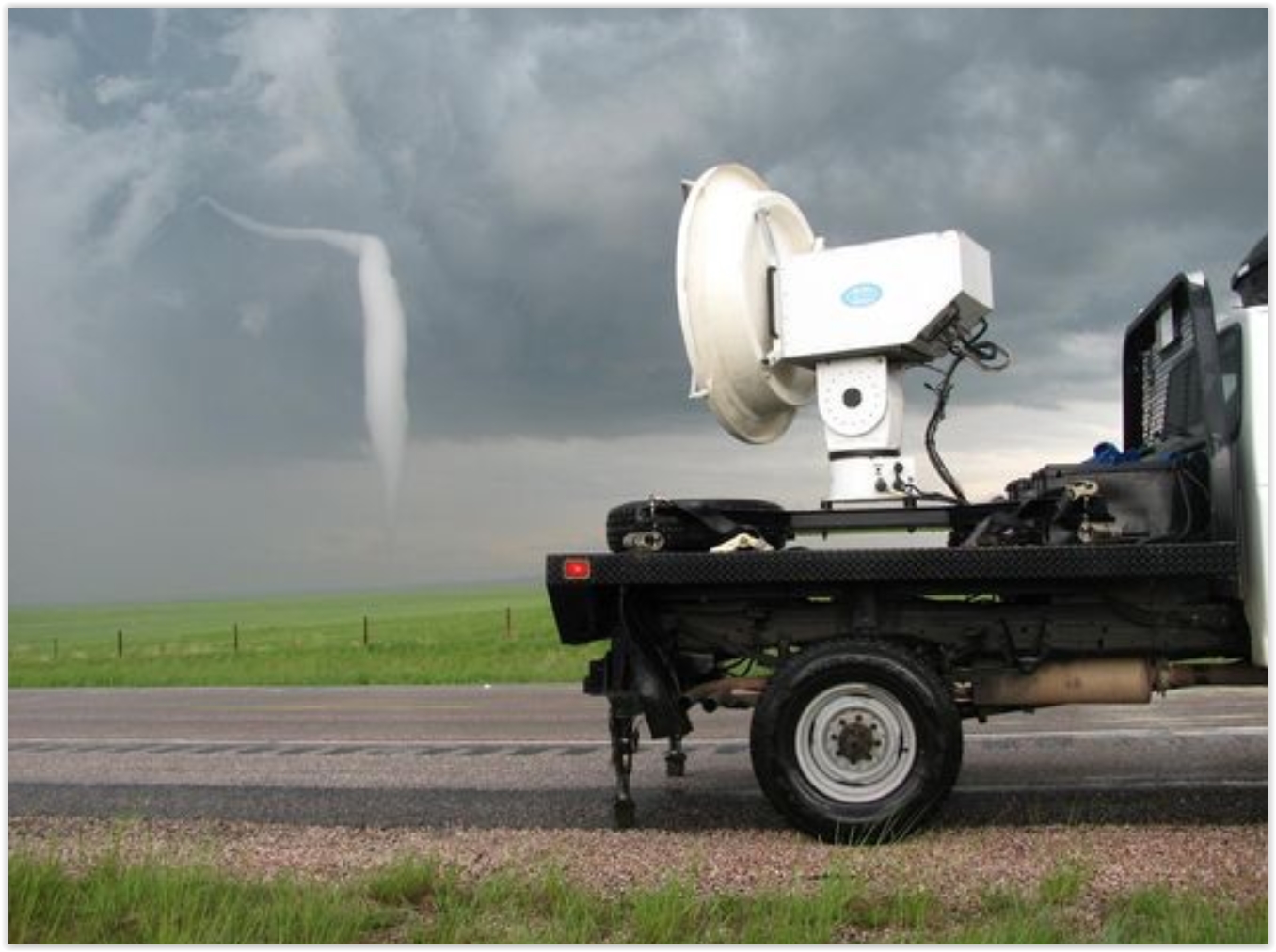 Deadly "Dixie Alley" Focus of New Tornado-Chasing Campaigns
Deadly "Dixie Alley" Focus of New Tornado-Chasing Campaigns.
Many of the tornadoes that strike the Deep South and southeastern USA
strike at night, or are rain-wrapped, making them much harder to track
and warn on in some cases. Here's an excerpt from
USA TODAY: "...
Known
as VORTEX-SE — a clever acronym for "Verification of the Origins of
Rotation in Tornadoes Experiment, Southeast" — the project follows in
the footsteps of large research campaigns that began 22 years ago in the
“Tornado Alley” of the Great Plains and sparked the 1996 Hollywood
blockbuster. The impetus for the venture — allocated a $5 million budget
from Congress — stems from a violent tornado outbreak in April 2011
that left hundreds dead, mainly in Mississippi, Alabama, Georgia and
Tennessee..."
Photo credit above: "
A University of Massachusetts radar truck observes a Wyoming tornado on June 5, 2009, during the VORTEX-2 campaign."
(Photo: Robin Tanamachi).
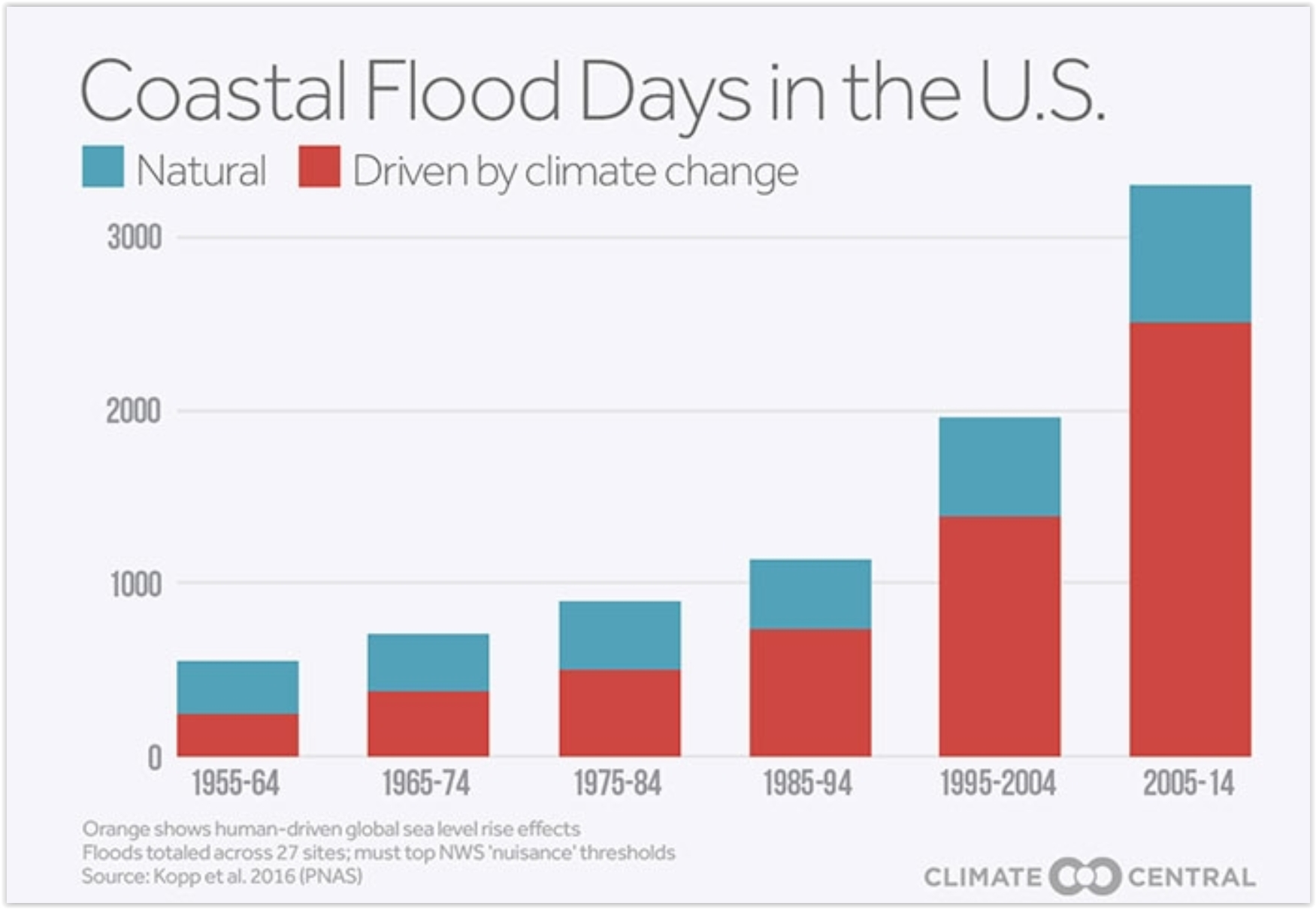 Study Reveals Stunning Acceleration of Sea Level Rise. Minnesota's lakes will look even better in the years to come; here's an excerpt from Climate Central: "...A
report published by Climate Central on Monday, the result of an
analysis based in part on the findings in Monday’s paper, concluded that
climate change was to blame for three quarters of the coastal floods
recorded in the U.S. from 2005 to 2014, mostly high tide floods. That
was up from less than half of floods in the 1950s. “I think this is
really a first placing of human fingerprints on coastal floods, and
thousands of them,” said Ben Strauss,
vice president for sea level and climate impacts at Climate Central.
Strauss led the analysis, which also involved government and academic
researchers
Study Reveals Stunning Acceleration of Sea Level Rise. Minnesota's lakes will look even better in the years to come; here's an excerpt from Climate Central: "...A
report published by Climate Central on Monday, the result of an
analysis based in part on the findings in Monday’s paper, concluded that
climate change was to blame for three quarters of the coastal floods
recorded in the U.S. from 2005 to 2014, mostly high tide floods. That
was up from less than half of floods in the 1950s. “I think this is
really a first placing of human fingerprints on coastal floods, and
thousands of them,” said Ben Strauss,
vice president for sea level and climate impacts at Climate Central.
Strauss led the analysis, which also involved government and academic
researchers..."
 St. Paul to Bar Itself From Investing in Fossil-Fuel Companies. Here's an excerpt from twincities.com: "The
city of St. Paul won’t be investing in oil companies in the near
future. Expressing concern about climate change, the St. Paul City
Council voted Wednesday on a resolution barring the city from investing pension funds and other public money directly into fossil-fuel companies.
The divestment decision is mostly symbolic, as the city’s public
employee pensions are managed by the Minnesota State Board of Investment
and not invested by the city itself
St. Paul to Bar Itself From Investing in Fossil-Fuel Companies. Here's an excerpt from twincities.com: "The
city of St. Paul won’t be investing in oil companies in the near
future. Expressing concern about climate change, the St. Paul City
Council voted Wednesday on a resolution barring the city from investing pension funds and other public money directly into fossil-fuel companies.
The divestment decision is mostly symbolic, as the city’s public
employee pensions are managed by the Minnesota State Board of Investment
and not invested by the city itself..." (Photo credit: Dan Anderson at
Flickr).
Follow The Leader: How 11 Countries Are Shifting to Renewable Energy. Climate Reality has the story; here's a clip: "...
In 2015, Sweden threw down the gauntlet with an ambitious goal: eliminating fossil fuel usage within its borders, and immediately ramping up investment
in solar, wind, energy storage, smart grids, and clean transport. And
the best part? The Swedes are challenging everyone else to join them in a
race to become the first 100-percent renewable countries. Now that's a
competition where everyone wins..."
 Electric Car Batteries Used To Be Ineffective and Pricy
Electric Car Batteries Used To Be Ineffective and Pricy.
That Era is Over.
Although Moore's Law doesn't apply innovation has been steady;
resulting in more power and range per dollar. Here's an excerpt from
Slate: "...
But the cost of that battery is another story. Thanks to continuous improvement, General Motors last year said
the new lithium-ion packs now cost it about $145 per
kilowatt-hour—about 70 percent cheaper than they did in 2012. Put
another away, the battery pack in the 2017 Volt will cost less than 10
percent more than the one in the 2012 Volt. But it will be more than
four times more powerful..."
Photo credit: Carolyn Kaster, AP.
Study: Fully-Automated Self-Driving Cars Could Actually Be Worse for Carbon Emissions. Here's a snippet from a story at
Vox: "...
It
stands to reason that vehicle automation could save energy and reduce
emissions in some ways. Cars will be able to chain together more
aerodynamically, drive at more consistent speeds, and perhaps serve as
shared vehicles in lieu of individual vehicle ownership. But it also
stands to reason that automation could increase energy use and emissions
in some ways. If driving is easier and more pleasant, people will do it
more. Automation will open up car travel to populations (the young, the
elderly, the visually or otherwise impaired) who did not previously
have access..." (Image: Shutterstock).
Pilot Reveals Unsettling Reason Why Plane Lights Are Dimmed for Landing.
New.com.au and The Sun has details: "...
Dimming
cabin lights before descent subtly prepares passengers to find their
way to an emergency exit, especially when the aisle is illuminated.
There are also health and safety reasons behind asking passengers to
leave their blinds up before landing. By allowing more natural
brightness into the aircraft, if the cabin lights cut off during a
crisis, it is easier for passengers to see the path towards an emergency
exit..."
How to Blend In Somewhere You Stick Out. You know, like Des Moines or Green Bay?
Airfarewatchdog.com has a few good tips for power-travelers preparing for spring break; here's an excerpt: "...
Everyone
sticks out somewhere. If you're exploring a place where you don't look
like most of the other people, assume you're doing this whole travel
thing right. But there are benefits to blending in, too, even when your
height, hair or skin color, gender, or other physical traits set you
apart. Because really, how you look is only the most obvious way you're
standing out. There are plenty of other things—clothing, body language, social codes—that can help you blend in more, even if no one is ever going to mistake you for a local..."
The Night The Beatles Played to 18 People. Yes, everyone has their share of oh-crap moments. Even members of The Beatles. Here's an excerpt of an article at
Mashable: "...
The
gig was billed as a battle of the bands between Liverpool’s Beatles and
London’s Ivor Jay and the Jaywalkers. The opponents never showed. When
the Beatles arrived after being driven nine hours drive from Liverpool
by Leach’s friend Terry McCann, their posters were nowhere to be found,
and they had to wait to be let into the venue. That night, the Beatles
played their usual covers of Chuck Berry and Jerry Lee Lewis to about 18
very bored people..."
Image credit: Beatles Source.
TODAY: Partly to mostly cloudy, cold wind. Winds: NW 10-20. High: 34
MONDAY NIGHT: Partly cloudy and cold. Low: 16
TUESDAY: More sunshine, less wind. Chilly. Winds: NW 8-13. High: 26
WEDNESDAY: Clouds increase again. Winds: SE 10-15. Wake-up: 17. High: 32
THURSDAY: Overcast, few flurries possible. Winds: SE 8-13. Wake-up: 24. High: 33
FRIDAY: Mostly cloudy, trending milder. Winds: S 7-12. Wake-up: 27. High: 37
SATURDAY: Early mix, warming trend continues. Winds: S 7-12. Wake-up: 29. High: 43
SUNDAY: More subtle hints of spring fever under partly sunny skies. Winds: SW 10-15. Wake-up: 24. High:
Climate Stories....
Arctic Warming: Why Record-Breaking Melting is Just The Beginning. When
you hear scientists using terms like "absurdly warm" and "off our
chart" you get a sense of the magnitude of warming observed at the top
of the world; here's an excerpt from
The Independent: "...
This
year’s record low has been driven by what NSIDC calls an “absurdly
warm” winter: its director, Mark Serreze, has described it as the
strangest ever observed in the region. The US government’s National
Oceanic and Atmospheric Administration says the warming is “off our
chart”. In late December, temperatures within 200 miles of the North
Pole actually peaked above freezing point. During January they averaged
13F above normal across the Arctic; even the coldest reading, recorded
in Svalbard, north of the Arctic Circle, was warmer than the average
highest temperature in previous years..." (Image:
Climate Reanalyzer).
House Science Chairman Pressure NOAA Anew on Climate Change Study. The saga and fishing expedition continues, as described at
Government Executive:
"Though some in the scientific community thought he was backing off,
House Science panel Chairman Rep. Lamar Smith, R-Texas, this week
stepped up his demands that
the National Oceanic and Atmospheric Administration locate and hand
over more documents relating to a controversial 2015 climate change
study. In a
Feb. 22 letter to
NOAA Administrator Kathryn Sullivan, the head of the House Science,
Space and Technology Committee complained that the agency’s response to
his subpoena last October had resulted in only 301 pages of documents,
many containing duplicative emails..."
Photo credit above: "
Rep. Lamar Smith, R-Texas, was not satisfied with NOAA's response to his last request for documents." Charles Dharapak/AP file photo.
Climate Change is Wreaking Havoc on our Mental Health, Experts Say. Here's an excerpt from a story at The Toronto Star: "...Signs
of mental distress related to climate change have appeared in
vulnerable populations, from drought-stricken prairie farmers to
isolated aboriginal communities and the scientists who crunch climate
data. Our fast-changing climate has long been identified as a threat to
physical health, but more psychologists are warning that the mental
health impacts and the economic toll they take are real, likely to
spread and need closer study. “We may not currently be thinking about
how heavy the toll on our psyche will be, but, before long, we will know
only too well,” warned a 2012 report from the U.S. National Wildlife Federation..."
Climate Change is Shifting Natural Resources and Wealth Along With It. Here's the into to a story at
Newsweek: "
As
the planet warms, plants, trees, fish and other natural resources are
on the move, shifting toward the poles, in the direction of higher
elevations and deeper into the seas, states a paper
published February 24 in the journal Nature Climate Change. This
natural capital has economic value, especially in developing countries
where it accounts for a large share of resources. The team of
researchers led by Eli Fenichel, an assistant professor at the Yale
School of Forestry & Environmental Studies, say that where the fish
migrate, money will follow, but that it’s not as simple as this..."
Photo credit above: "
A
fisherman's boat as seen on Bolivia's dried Poopo lakebed, south of La
Paz, last December. A new study argues that as natural resources like
fish migrate due to climate change, dramatic changes in global wealth
will follow." David Mercado, Reuters.
Arctic Feedback: Is Rapid Warming Fueling More Dangerous Storms? The jury is still out, the science far from settled, but
The Independent has the results of new research attempting to connect the dots; here's an excerpt: "...
Dr
Peter Gleick, president of the Pacific Institute in California, said
there was a growing body of “pretty scary” evidence that higher
temperatures in the Arctic were driving the creation of dangerous storms
in parts of the northern hemisphere. According to a graph on the US National Snow and Ice Data Centre’s website,
there were 14.2 million km squared of sea ice on 24 February. On an
average year over the last three decades, it would take until about 29
April for there to be as little sea ice as temperatures warm in the
spring. Since about 10 February, the area covered by sea ice has been
noticeably below any of the last 30 years as the Arctic has experienced
record-breaking temperatures of about 4C higher than the 1951-1980
average for the region..."
Graphic credit:
National Snow and Ice Data Center.
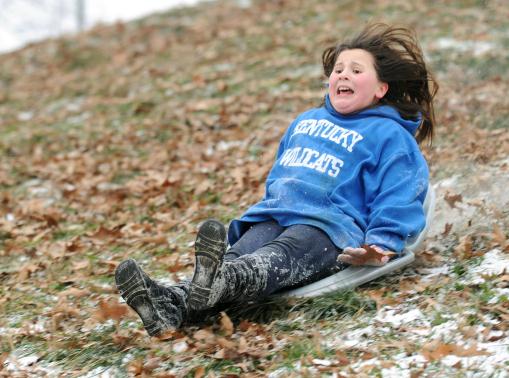
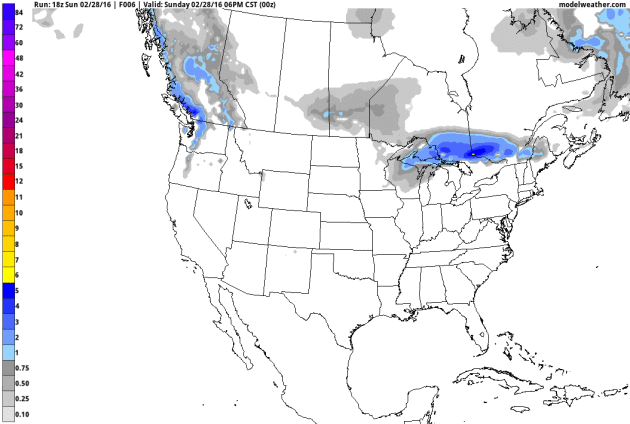
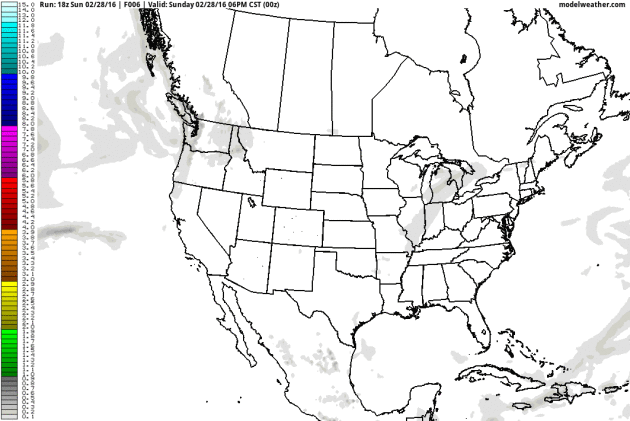
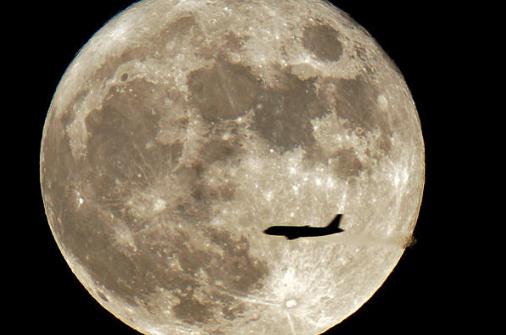
You forgot Sunday's high. Unless you're trying to build suspense.
ReplyDelete